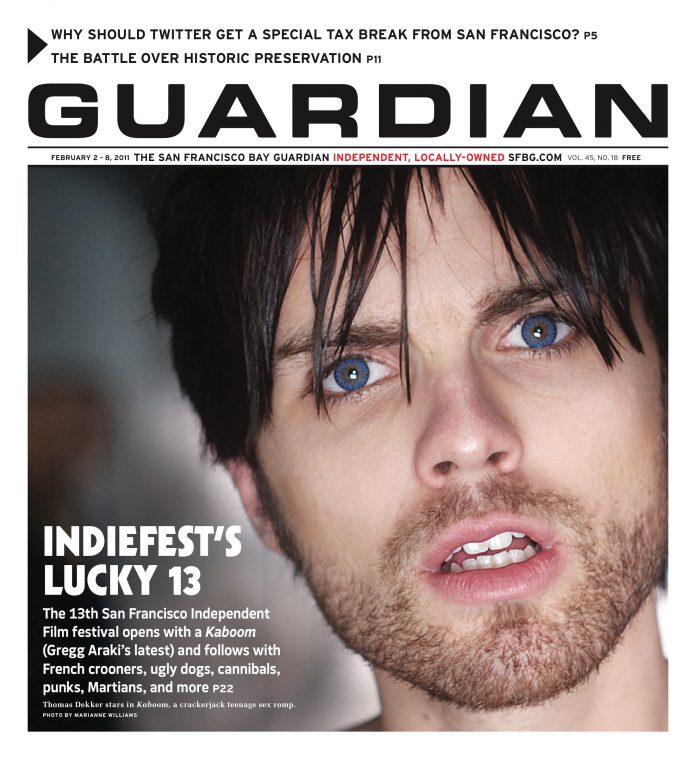MUSIC Last year was a big one for Los Rakas. The Oakland-by-way-of-Panama duo, Raka Rich and Raka Dun, have been hustling their frenetic Panabay stylings since they banded together as high school students in 2005. But on the cusp of their second mixtape, La Tanda Del Bus, the arresting diversity of their influences and musical ideas began to coalesce. The far reaches of the blogosphere and the streets took notice.
Los Rakas’ “Abrazame” — a song reworked from Gyptian’s crossover hit “Hold You” and remixed into sure shot form by Brooklyn producer Uproot Andy — overcrowded year-end lists as the pinnacle summer jam of 2010. In the video, parallel love stories unfold and collapse over the backdrop of San Francisco’s Carnaval Festival. Shuffling polyrhythms swarm underneath simple Casio chords as Raka Rich moves effortlessly from trading syrupy verses with guest songstress Faviola to bursts of rapid-fire lyricism.
Meanwhile, the video for Los Rakas’ “Soy Raka” — a youthful ode to turfin’ in the streets of Oakland — has surpassed 250,000 hits on YouTube. What other rap groups spit a chorus like “Tengo mi pistola y diente de oro” on the same playlist as a sweltering love ballad? The video not only helped spawn the syncopated dance movement in Panama, but also inspired kids to prefix their names with Raka — “you know, like Raka Miguel” — Dun tells me excitedly in a thick Spanish accent. “In Panama, ‘That’s raka’ or ‘We’re from raka’ means ‘that’s ghetto’ or ‘we’re from the ghetto.’ But it’s an empowering term. It means that we’re proud of who we are and where we come from.”
This sort of community-centered spirit has inspired Los Rakas since the beginning of its rhapsodic ventures. In 2006, Rich and Dun released their first Panabay Twist mixtape with the help and studio support of local outreach organizations Youth Uprising, BUMP (Bay Unity Music Project), and Youth Movement Records. Its single, “Mi Barrio,” in many ways a precursor to the anthemic “Soy Raka,” is driven by the standard hip-hop commandment to represent where you’re from. But the song also honors a more difficult and subtle hip-hop ideal: one love. Los Rakas might boast about Oakland and Panama stomping grounds, but the duo also calls out for us to be “orgulloso and put your flag in the air.” Which flag, exactly?
“Oakland influenced us,” says Dun, who moved to the Bay when he was 14. “It didn’t just shape our instrumentals and lyrical style, from Zion I to E-40—Oakland has the history of the Black Panthers and politicism, so we naturally put that content in our music too.”
Los Rakas sound a bit different from, say, any other Bay Area rapper, because Rich and Dun’s music is informed by the infectious rhythms and punctuated Spanish flows heard in Panama’s pop music of the day, plena. A sprawling folk genre that originated in the Caribbean and related regions of Central America, plena has recently been digitized for a new generation, becoming a Panamanian spin on reggaeton.
But the influences don’t stop there. “In Panama we listen to all types of music: reggae, dancehall, salsa, meringue,” says Dun. “When I met Rico, he was listening to Tupac and we traded music. Hip-hop caught my attention fast. I found out about Tribe [Called Quest], Lil Kim, Nas. I researched where it came from, and how it evolved, and just fell in love with it.” Although the connections aren’t obvious at first, hip-hop and plena have a lot in common. They’re both hybrid genres, forms of pastiche that draw from a wide range of sonic traditions and background, computerizing folk and funk for the bass-hungry children of the always-evolving soundsystem.
Unsurprisingly, Los Rakas garnered attention from an emerging scene of enthusiasts, producers, DJs, writers, and musicians concerned with the musical diaspora of the Afro-Caribbean, or more acutely, what British sociologist Paul Gilroy has called the Black Atlantic. The term denotes the webbed network of the African diaspora culture that is not so much organized by a clear conception of roots but by a rhizomatic set of exchanges and networks: migrations, ships, trade, Creole, European miscegenation, flights, origin myths, stories of repatriation, and now the most diffusive cross-cultural exchange device of them all, the Internet.
Keep in mind that 2010 was the year that Diplo and Switch’s over-the-top dancehall project, Major Lazer, took clubs by storm, and even Rihanna finally started reppin’ roots, rhythm, and wires with “Rude Boy” and multicolored neon booty shorts. Even if MIA’s third full-length was lackluster, something of her world-town swagger has penetrated our times, while her “Bird Flu” call to arms has circulated through our quickly multiplying musical economies. Check the formula: add world genre to rap and uptempo dancehall/Bmore/house/techno; reconfigure percussion patterns in a drum machine; loop melodic fragments of a regional instrument; add inner-city noise, gunshots, chants, or field recordings of aggressive animal life; manipulate with a swill of static, fuzz, and a heavy dose of low end. Bump loud. Call it third world democracy.
Los Rakas, without even asking for it, has popped up in countless mixes and blog posts loosely labeled under the category of tropical bass. Rich and Dun contributed the steady banger “Afro Latino” to the recent Banana Clipz EP, produced by tropical harbingers Chief Boima and Ora 11 of Bersa Discos, and released on their Ghetto Bassquake blog and upstart. Speaking of Bersa, it hosts the crazy monthly Tormenta Tropical, which spotlights new sounds of electro-cumbia and related frontiers arising from the Black Atlantic. “That movement, I’m not sure what to call it, embraced us,” says Dun. It only makes sense that Los Rakas — navigating Oakland and Panama, turfin’ and plena, hiphop and digital polyrhythms, the new and the old — has returned the favor.
AUDYSSEY PRESENTS THE NEIGHBORHOOD: LOS RAKAS
with Roach Gigz
Wed/2, 9 p.m.–-2 a.m.; free
111 Minna Gallery
111 Minna, SF
(415) 974-1719

